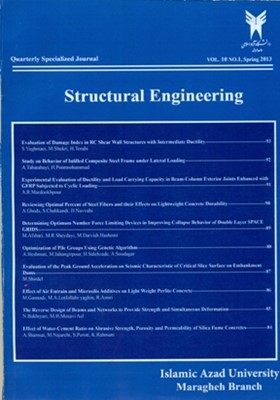Effect of Water-Cement Ratio on Abrasive Strength, Porosity and Permeability of Silica Fume Concretes
Subject Areas : Analysis of Structure and EarthquakeAbolfaz Shamsayi 1 * , Mohsen nacharchi 2 , Saber piroti 3 , Kamal rahmani 4
1 -
2 -
3 -
4 -
Keywords: Porosity, Key Words: abrasive strength, hydraulic conductivity coefficient, silica fume,
Abstract :
Abstract Today following the development of construction of hydraulic structures like dams, the matter of concrete durability used in these kinds of structures has gained paramount importance. One of the important factors of concrete durability in these structures is its resistance against abrasion due to the crash of particles carried by water. To enhance the abrasion resistance of concrete, different methods have been offered and investigated by researchers and one can refer to the following to name a few. Using aggregates resistant to abrasion, reducing the water-cement ratio, using nanocilica microcylis in concrete, suitable and on time seasoning. In the present research the following experiments have been done on concrete samples. -The abrasive strength of block samples of 15×15×15 cm for 28 past days using Sand Blast Method. -The hydraulic conductivity coefficient of cylinder samples with the height of 10cm., and 10cm., in diameter, 28 past days using Penetration Method. The results of abrasion experiments showed that by reducing water-cementratio from 0.50 to 0.33, the abrasive strength of concrete improves as far as 30.94 %. The permeability experiments showed that; By reduction of water-cement ratio from 0.50 to 0.33, the hydraulic conductivity coefficient of the concrete is reduced from 39.88 × 10 m/sec to 2.49 × 10 m/sec., and the porosity of concrete is reduced from 13.90 % to 13.10 %. The above results show that reducing water-cement ratio results in increasing abrasive strength and increasing the hydraulic conductivity coefficient and reducing porosity of silica fume concrete.

